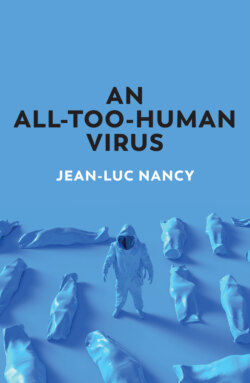Читать книгу An All-Too-Human Virus - Jean-Luc Nancy - Страница 6
Preface
Оглавление1. The texts in this volume were assembled at the initiative of Suzanne Doppelt, for the publisher Bayard, in June 2020, at the (very provisional) end of the period of lockdown, and then of progressive opening, in France. The intention was to keep a record of the reactions to the event brought about by the numerous demands and initiatives that arose at the time – at the very least, of the reactions of one of the numerous ‘philosophers’ (this term took on a very broad meaning) that were expressed at that moment. For me, this concerned in particular the YouTube channel created by Jérôme Lèbre, ‘Philosophizing in the Time of the Epidemic’, which ended up including about a hundred interventions. There was also Antinomie, the Italian online journal created by Federico Ferrari and his friends, and many other instances. It was thus very clear that the pandemic, even before it was given its name, brought about a properly viral proliferation of discourse. This was ridiculed, and rightly so. But it is no less right to listen to what was said, for better or for worse (and whether we like it or not), in an urgent situation marked by anxiety and a sudden loss of bearings.
And all the more so as this sudden disarray brought to light an unmooring of certainties or of habits, one that has been active and corrosive for a long time now in the public mind and in the sensibility of developed societies, particularly in Europe. Having emerged from the fault lines or the fissures of what for a long time we took to be western infallibility, the virus was almost immediately perceived as something that revealed – indeed, deconstructed – the fragile and uncertain state of our rational and smoothly functioning civilization.
This is also why it reveals, in a light that is harsher than ever, the exacerbated and unjustifiable gaps between regions, countries, classes and layers of a world that, in becoming more interconnected, is at the same time split asunder, torn apart by its own exponential growth.
Today, a few days after 15 August, in other words less than three months after the end of the lockdown in France, the resumption of the epidemic is already the subject on everyone’s lips; elsewhere in the world, above all in the United States and Brazil, it has raged even more than in Europe; just about everywhere, we keep watch, we measure, and we work to halt new developments. At the same time we are beginning to register the grave economic effects of the phenomenon.
The wait for an effective treatment has become so arduous that the head of state of ‘great Russia’ has judged it appropriate to pre-empt the laboratories by announcing the completion of a vaccine that is still in the test phase. Broadly speaking, heightened anxiety and feverish competition have combined to whet the desire for power. The virus catalyses forms of solidarity but also tensions, judging by the difficulties that Europe’s decision in favour of a joint aid package worth €500 billion (the implementation of which must still be overseen) has had to overcome. The telluric movements of global geopolitics are being felt in all their intensity, together with the no less telluric movements of technoeconomic powers.
Tellus, the Roman divinity of earth, also associated with the underworld, holds the powers of life and death.
*
2. The virus is single-handedly revealing a world that for a long time now has been feeling the distress of a profound mutation. What is at stake is not simply the organization of forms of domination: an entire organism feels sick. What is being called into question is an obstinate confidence in the belief in progress and in unpunished predatory behaviour – but without any new conviction arising about the possibility of inhabiting the world humanely.
Not so long ago, these words of Hölderlin used to come up often in learned discourse: ‘Poetically man dwells on this earth.’ We sought to find virtue in the precious sounds these words made in our throats. We almost always forgot to cite the entire sentence: ‘Full of merits, but poetically, man dwells on this earth.’1 The ‘poetic’ is, if not opposed, then at least contraposed to the ‘merits’ of humans, namely their achievements and their acquisitions. The German word Verdienst has, first and foremost, the sense of ‘gain, profit’. If, already for Hölderlin, it is in spite of their exploits that humans live or can live in a poetic mode, we must say that, today, it is in spite of their poetic nature or vocation that humans lose themselves in the abundance of their conquests, with all their consequences: destruction, misery and aberrance.
The COVID-19 pandemic is merely the symptom of a more serious illness, which touches humanity in its very ability to breathe, in its capacity to speak and think beyond information and calculation.
It is possible that this symptom will make us see the necessity of combating the pathology beneath it, and will force us to go in search of a vaccine against the success and the domination of self-destruction. It is also possible that other symptoms will follow this one, up to and including the inflammation and the dying out of vital organs. This would mean that human life, like all life, is reaching its end.
1 1. Tr.: Friedrich Hölderlin, ‘In Lovely Blueness …’, in his Poems and Fragments, trans. Michael Hamburger. Ann Arbor: University of Michigan Press, 1968, p. 601; translation slightly modified in accordance with Nancy’s text (Hamburger translates voll Verdienst with ‘full of acquirements’).
